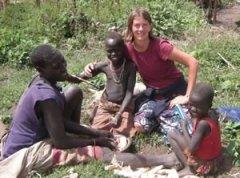Born to be a missionary

On June 19, 2009, Elly Admiraal ’95 and 11 fellow missionaries hiked through the night across 10 miles of rough, mountainous terrain in South Sudan. Single file, they navigated by feel, carrying no lights, for fear of being detected by a faction of the Didinga tribe that had threatened them with death the afternoon before. At sunrise the group arrived at a narrow airstrip and was evacuated to safety in Tanzania.
Describing the ordeal to her mother over the phone, Admiraal told her that if she had the choice, she was going back to the Didinga hills.
“My mom asked, ‘Why would you die for this?’” Admiraal remembered. “I said, ‘This work is what I was born to do.’”
She had her first inkling of her vocation 15 years earlier, in Kenya, on an interim class with Professor George Monsma. She signed up for the class because of her interest in the land and animals of Africa. But while on safari, God spoke to her, Admiraal said. “He said, ‘I love these animals, but look at my people.’”
From that moment on, she’s been on a path to bring the gospel to Africans, especially those who have never heard it. In October 2008 she joined the 12-person Africa Inland Mission (AIM) team that was moving into a remote area called Makiria in the very southern tip of Sudan. Before the team’s arrival, the Didinga in Makiria had never seen white-skinned people. Up until two years ago, the Didinga language had no written alphabet.
Living in traditional huts of woven sticks, Admiraal and the AIM team visited family compounds, building relationships. All seemed to going well—except that in the spring of 2009 the rains didn’t come to this people dependent on agriculture.
By June, desperation drove Didinga from a neighboring mountain ridge to come to Makiria and stir up suspicion of the missionaries. A crowd of 80 to 100, half of them with weapons, forced four of Admiraal’s mission partners to walk to a site where some 300 people had gathered for a trial. Tribal elders from the neighboring community charged that the missionaries had stolen the tribe’s thunder stone and put it on a plane to America so the rains would not come. Accusations escalated. Then, at dusk, the elders unexpectedly adjourned the trial, but with the threat that if the missionaries did not return in the morning with two bulls, they would be killed. After hours of prayer, all 12 AIM mission partners, including Admiraal, walked out of Makiria an hour after midnight.
“I’ve never been in such a spiritually dark place,” Admiraal said. “It was so evident they had no concept of a good God.”
That has changed—testimony, Admiraal said, of the mysterious ways of God. After the AIM team’s departure, a Didinga Christian from another area was sent to guard the AIM leader’s compound. He began Bible studies, which have now grown into a church community of 30 to 50 members.
Admiraal is back in South Sudan, working in Nagishot, site of the evacuation airstrip and an established Didinga church. Every other week she and two other missionaries hike the 10 miles they hiked in terror last June, now welcomed by the burgeoning church in Makiria.
“The love we have for the people is now being reciprocated,” she said. “God has brought about real heart change.”
Still, there is little security for Admiraal. “But I’m rarely scared,” she said. “There’s a sense that we’re in the center of God’s will, and there’s always peace in that.”






